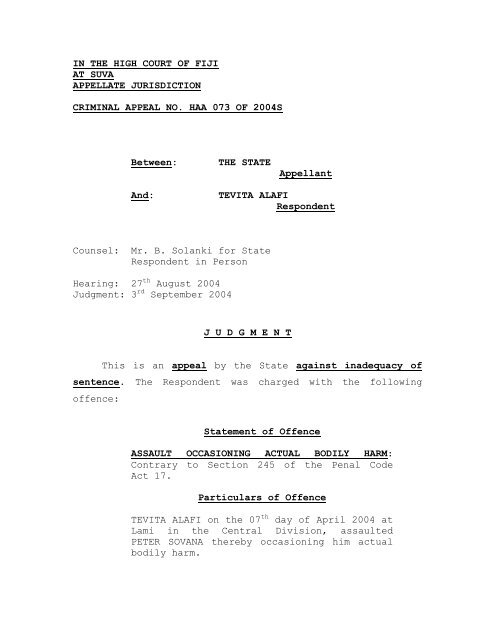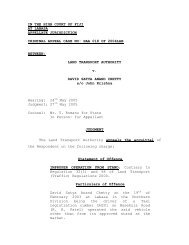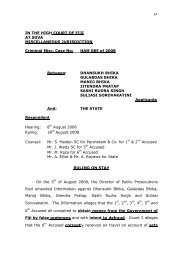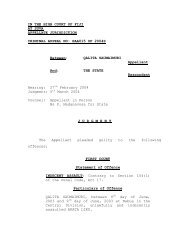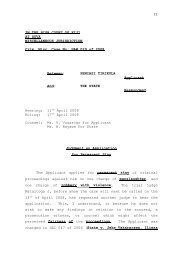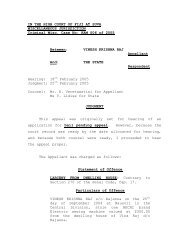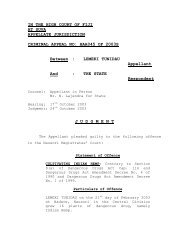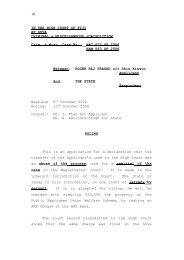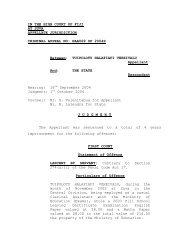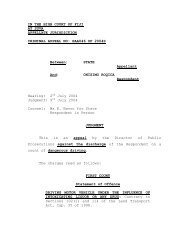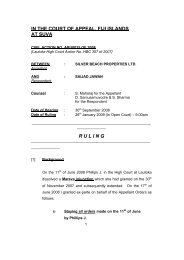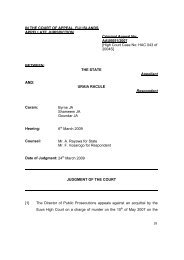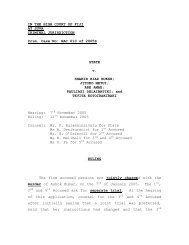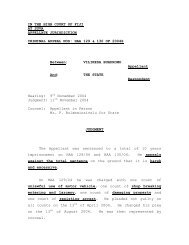Download State v Tevita Alafi Judgement - Law Fiji
Download State v Tevita Alafi Judgement - Law Fiji
Download State v Tevita Alafi Judgement - Law Fiji
You also want an ePaper? Increase the reach of your titles
YUMPU automatically turns print PDFs into web optimized ePapers that Google loves.
IN THE HIGH COURT OF FIJIAT SUVAAPPELLATE JURISDICTIONCRIMINAL APPEAL NO. HAA 073 OF 2004SBetween:THE STATEAppellantAnd:TEVITA ALAFIRespondentCounsel: Mr. B. Solanki for <strong>State</strong>Respondent in PersonHearing: 27 th August 2004Judgment: 3 rd September 2004J U D G M E N TThis is an appeal by the <strong>State</strong> against inadequacy ofsentence. The Respondent was charged with the followingoffence:<strong>State</strong>ment of OffenceASSAULT OCCASIONING ACTUAL BODILY HARM:Contrary to Section 245 of the Penal CodeAct 17.Particulars of OffenceTEVITA ALAFI on the 07 th day of April 2004 atLami in the Central Division, assaultedPETER SOVANA thereby occasioning him actualbodily harm.
2On the 14 th day of May 2004, he pleaded guilty to thecharge. The facts were that on the 17 th of April 2004 theRespondent was employed at Waterlife Exporter (<strong>Fiji</strong>)Limited at Wailada, Lami. His employer was Peter Savonathe complainant. The Respondent came to work at 7.40 a.m.He was expected at 7.00 a.m. The complainant questionedthe Respondent about his late arrival. The Respondent saidhis father was seriously ill. Both men began to argue andthe Respondent punched the complainant on the face causinginjuries. The medical report tendered shows that thecomplainant had a fractured jaw. The fracture wasconfirmed on an x-ray and the doctor stated in the reportthat the injury had been caused by blunt trauma to theright jaw.The Respondent accepted the facts and six previousconvictions. The convictions are old (1977 and 1991) andwould be expected to be disregarded. Indeed the learnedMagistrate did not refer to them at all.In mitigation the Respondent said that he was 45 yearsold, married with 5 children, that he was then unemployed,that he had assaulted the victim because the victim hadsaid – “what’s important – your dad or your work?” and thathe had reconciled with the complainant. He also said thathis father had passed away the same week and that he hadalso lost his job.The learned Magistrate then said:“1. Plea in mitigation noted.2. Last warning.3. Discharged without conviction (Section44 of the Penal Code).”
3The <strong>State</strong> appeals against the discharge on the groundthat it was wrong in principle and manifestly lenient. Atthe hearing of the appeal the <strong>State</strong> sought leave to adducefurther evidence, in the form of the affidavit of PeterSavona. This affidavit sets out the complainant’s versionof the facts, and of the injuries he received. Itcategorically denies any reconciliation. It further statesthat Peter Savona tried to put these facts before thelearned Magistrate but that the solicitor he had instructedto do this had failed to appear in court.The Respondent said initially that he objected to thecontents of the affidavit. However when I went through theparagraphs with him in court, he agreed to all paragraphsexcept for Paragraph 28 which states that the complainantnever said the words “what’s important – your dad or yourwork?.” He does not dispute the assault, the resultinginjuries or the lack of reconciliation. However he said incourt that he thought reconciliation had been effectedbecause the complainant had “apologised” to the Respondent.It appears that much of the affidavit evidence is notdisputed. It is relevant to sentence because it is avictim impact statement, and I am satisfied that the <strong>State</strong>has shown good reasons for non-disclosure of the evidencein the lower court. The affidavit is accepted in evidence.With or without the affidavit, a Section 44 dischargewas quite inappropriate in this case. Absolute dischargesare appropriate in those cases where the accused is notmorally blameworthy (and perhaps ought not to have beencharged) and where the accused is guilty only of atechnical breach of the law. This case falls into another
4category. This was an act of deliberate assault whichcaused serious injury to the victim. The injury requiredmedical treatment for one month after the assault. It wasalso an attack from the back and there was noreconciliation. The Respondent continues to harbourresentment towards the complainant and clearly is notremorseful although he did plead guilty. This was not acase for an absolute discharge.The Respondent has successfully stayed out of troublefor thirteen years. He informed me that he is now employedin Nadi as a diver, and earns $400.00 a week. Of this$100.00 is spent on his seven children. I am satisfiedthat he has sufficient means to pay $500.00 compensation tothe victim for reimbursement of medical expenses and formeeting in part, the trauma and distress experienced byhim. I consider that an order for compensation isappropriate, in order that it is brought home to theaccused that he must take responsibility for his violentbehaviour.This compensation order must be accompanied by asentence of imprisonment. In Raylu Chetty v. <strong>State</strong> Crim.Appeal No. 32 of 1998, Pathik J. reduced a sentence of atotal of fifteen months imprisonment for act with intent tocause grievous harm and unlawful wounding in respect of anassault by the throwing of a bottle. He substituted aconviction for assault occasioning actual bodily harm andreduced the sentence to nine months imprisonment,suspending it for eighteen months.In Elizabeth Joseph v. <strong>State</strong> Crim. Appeal HAA 030 of2004S, the accused was convicted of assault occasioning
5actual bodily harm, for trying to stab her partner’s wifewith a pen knife. The victim received a cut on the finger.In that case I said that an assault with a weapon calledfor a custodial sentence and upheld the four-month termimposed by the Magistrates’ Court.In this case, I consider a starting point of eightmonths imprisonment to be appropriate. Aggravatingfeatures are the strength of the punch, the fact that itwas inflicted from the back, the fact that the Respondentassaulted his employer, the fact that the Respondent madeno attempt to apologise for the assault and the fracturecaused by the assault. I arrive at twelve monthsimprisonment. Mitigating factors are that the Respondenthas avoided criminal behaviour for thirteen years, that hewas distressed at his father’s illness and his readiness togo to the police and accept responsibility for his action.I also take into account his family background and the factthat he is now in regular employment. I reduce the term bysix months to six months imprisonment.I consider that this term should be suspended. Ibelieve that the victim should be financially compensatedfor the injuries he received and such compensation cannotbe ordered if the Respondent is to serve his term inprison.As such I suspend the term for eighteen months. Ifthe Respondent re-offends in the next eighteen months hemay have to suffer activation of the six-month term. Thisin itself will have a deterrent effect.


